-
A Remarkable Career (Excerpted and adapted from the program of a 1991 Symposium at the NYU School of Medicine honoring Saul Krugman)
The first scientific article Saul Krugman wrote appeared when he was 39 years old; he eventually wrote more than 250 articles, and was the co-author of a leading text on infectious diseases, Krugman's Infectious Diseases of Children, with a tenth edition published in 1998. His most frequently cited article, "Infectious Hepatitis: Evidence for Two Distinctive Clinical, Epidemiological, and Immunological Types of Infection" JAMA , 200(5):365-73, 1967, appears in Morton's Medical Bibliography, a compilation of the most important works in the history of medicine. Click here for a listing of abstracts of Dr. Krugman's published works in the NYU Health Sciences Library's Faculty bibliography.
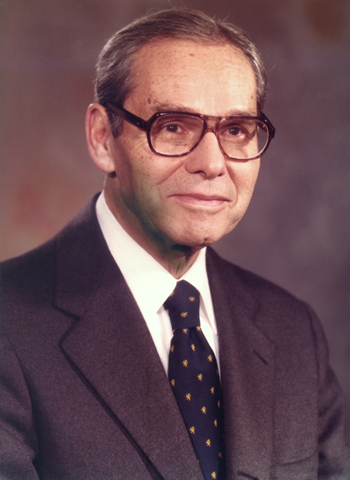
Saul Krugman, M.D.
-
A Remarkable Career
The focus of Dr. Krugman's efforts was the prevention and control of infectious diseases. He and his colleagues evaluated and helped formulate the policies for clinical use of the newly developed vaccines against poliomeyelitis, measles, rubella and hepatitis B. In the course of these efforts, he actively participated in studies around the world - Nigeria, Israel, Greece, Taiwan, Japan, New Zealand - giving generously of his knowledge and experience.
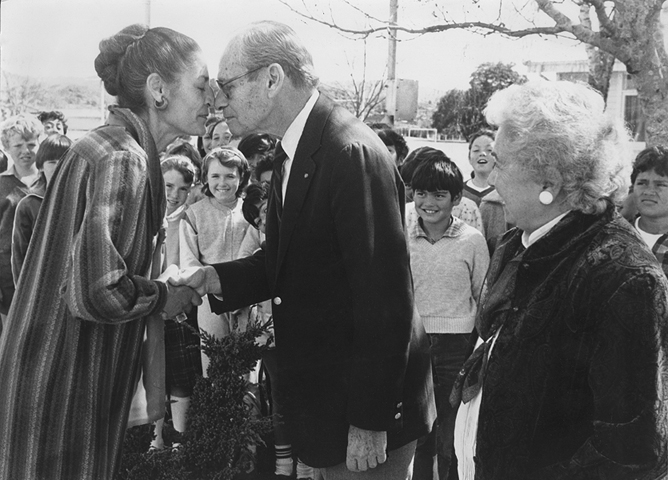
Dr. Krugman receiving a traditional Maori greeting in New Zealand
-
Scientific Achievements
Dr. Krugman's most important scientific achievements were in the unraveling of the mysteries of "infectious hepatitis." In the mid-1950's, endemic infectious diseases punctuated by epidemics were a constant cause for concern at the Willowbrook State School. The Medical Superintendent turned for assistance to Saul Krugman and his close friend and colleague, Robert Ward, as experts in infectious diseases. The problem of measles, lethal in that environment, was quickly solved with the new vaccine, which was licensed in the U.S. in 1963. Hepatitis, however, absorbed the energies of Krugman and Ward, later joined by Joan Giles, for many years.
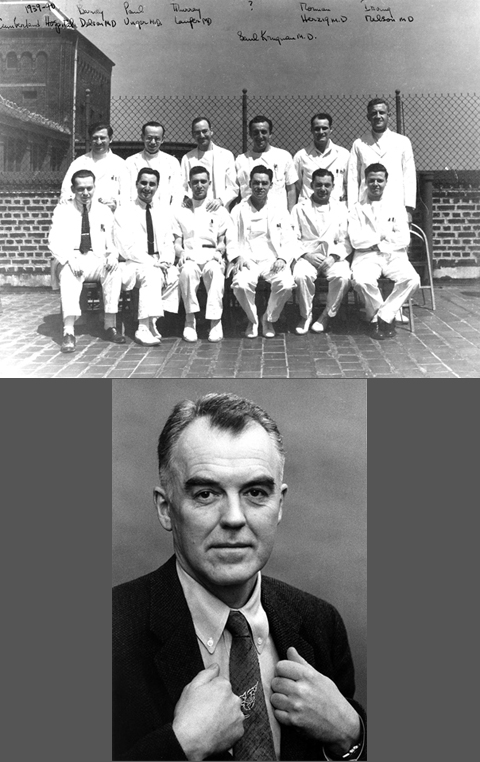
Dr. Krugman (front row, 3rd from left) with staff at Cumberland Hospital (top), Dr. Robert Ward, former Professor of Pediatrics (bottom).
-
Hepatitis A and B
Starting with careful clinical and epidemiological studies, they discovered that virtually the entire patient population and staff became infected shortly after arrival at the institution unless they had been previously infected. Most infections had gone unrecognized until Krugman and Ward arrived. And more surprisingly two clinically distinct types of hepatitis, now known as hepatitis A and B, actually co-existed at Willowbrook. The many cases of so-called "relapse" had actually been reinfections with a different virus.
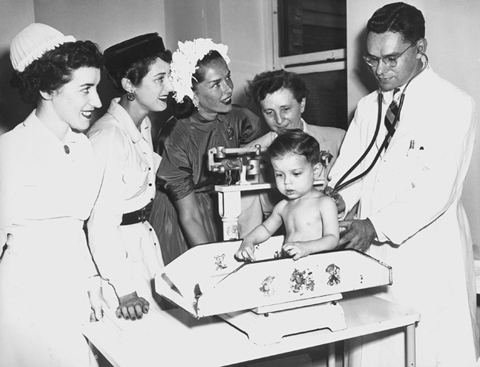
Dr. Krugman with young boy, Dr. Elaine Ralli, nurse and Sloan Simpson, wife of NYC Mayor William O'Dwyer.
-
A leap of imagination
An inspired leap of imagination led to exposing pooled serum from patients with hepatitis B to a temperature of 98 degrees Fahrenheit for just one minute. Administration of the serum to susceptible subjects conferred immunity without causing infection. The course was now set for the eventual control of hepatitis B, the more serious of the two diseases. The uniqueness of an experiment that required only a hot plate, needle and syringe to perform, and yet had such enormous health implications was accorded an immediate, enthusiastic reception by the medical community.
Tackling a major world problem and offering a solution is enough to earn an individual a place in medical history. But Krugman gave the world much more than that. Author of the leading text in infectious diseases, popular lecturer and indefatigable traveler, he was well known to clinicians. Generous to his colleagues with those precious, meticulously annotated frozen serum samples and equally valuable advice, he was just as familiar to academicians. Possessed of extensive experience and excellent judgment, Saul Krugman was commonly called upon to participate in health policy decisions here and abroad: consultant to the Bureau of Biologics, member of the WHO Expert Advisory Panel on Virus Diseases, Chairman of the Hepatitis Panel of the U.S.-Japan Cooperative Program, Deputy Director of the Commission on Viral Infections for the Armed Forces Epidemiological Board, among others.
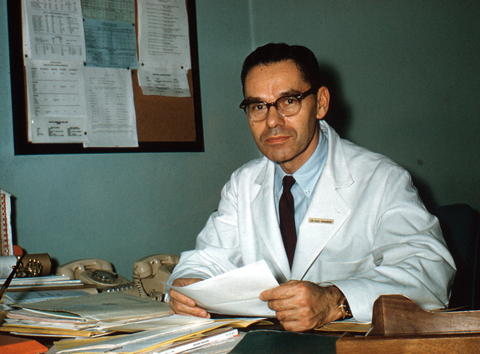
New Chief of Pediatrics Department, 1960
-
Lasker Public Service Award
For over 50 years, Saul Krugman was tireless in pursuit of his professional ideals. His remarkable steadfastness in purpose enabled him to continue his work in the face of severe criticism. Time has vindicated his actions. In addition to the Lasker Public Service Award, the National Academy of Sciences elected him as member in 1976.
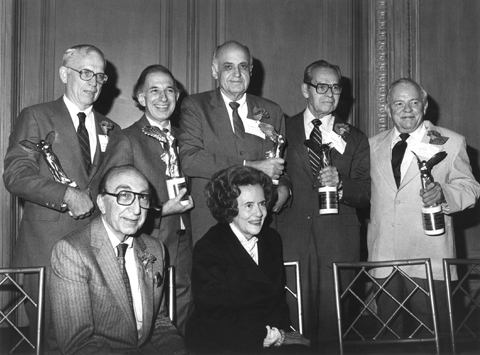
Dr. Krugman with Lasker Award winners
-
Lasker Award
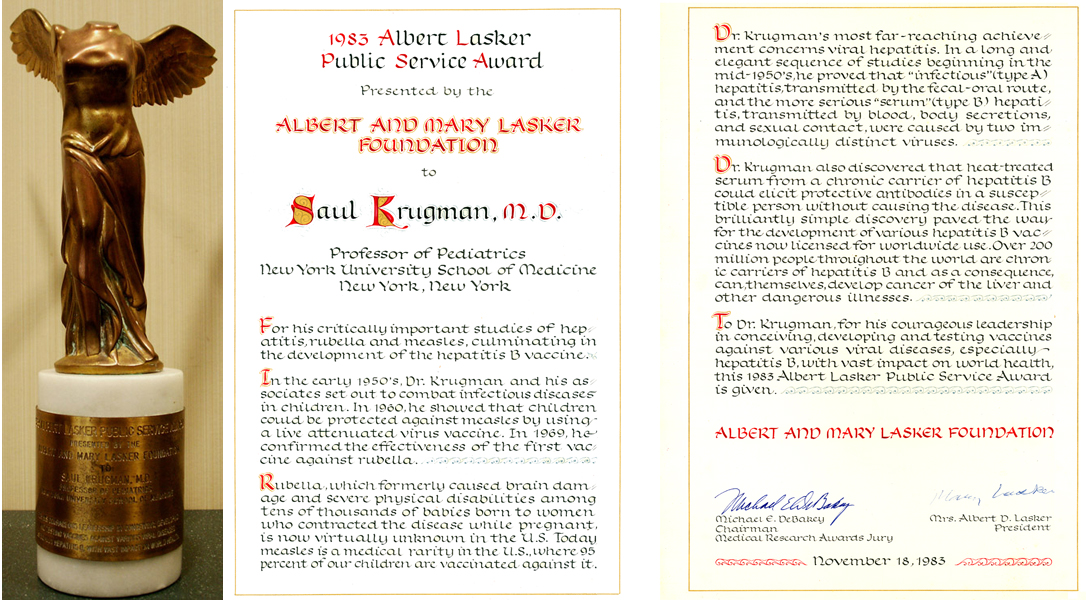
The Lasker Public Service Award Statuette, approx 17" tall 6" diameter, is a copy of the Winged Victory of Samothrace (left), Lasker Public Service Award (right)
-
The John Howland medal
These accolades were but two of many honors received over the course of his lengthy and distinguished career. Of those many honors, which began with membership in the Alpha Omega Alpha Honorary Society, and continued until 1994, when the New York State Department of Health gave him its Immunization Award, two of the most significant bestowed on Krugman by his peers were the Howland award and the Bristol award.
Widely considered to be the most prestigious award in the field of pediatrics, the John Howland medal honors those whose research and teaching have contributed to the advancement of pediatrics and to the improvement of children's health. In 1981, members of the American Pediatric Society (APS) bestowed this, their highest honor, on Saul Krugman.
Available in PDF:PDFs posted with permission of the copyright holder Pediatric Research. These articles may not be distributed without prior permission of the publisher.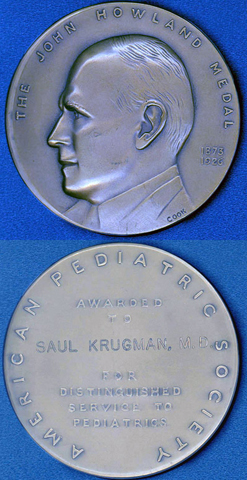
Howland Award
-
The Bristol award
The Infectious Diseases Society of America also honored Krugman with a prestigious award. In 1976, the same year he was elected to the National Academy of Sciences, the IDSA named Krugman as the recipient of the Bristol award, in recognition of his thirty years of accomplishments and contributions to the acquisition and dissemination of knowledge about infectious diseases.
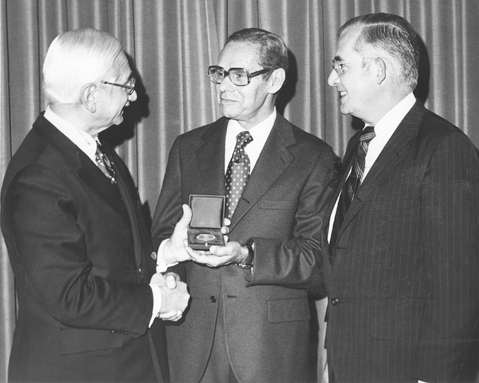
Dr. Krugman with cousin Albert Sabin on the occasion of receiving the Bristol Award
-
Bristol Award and Medal
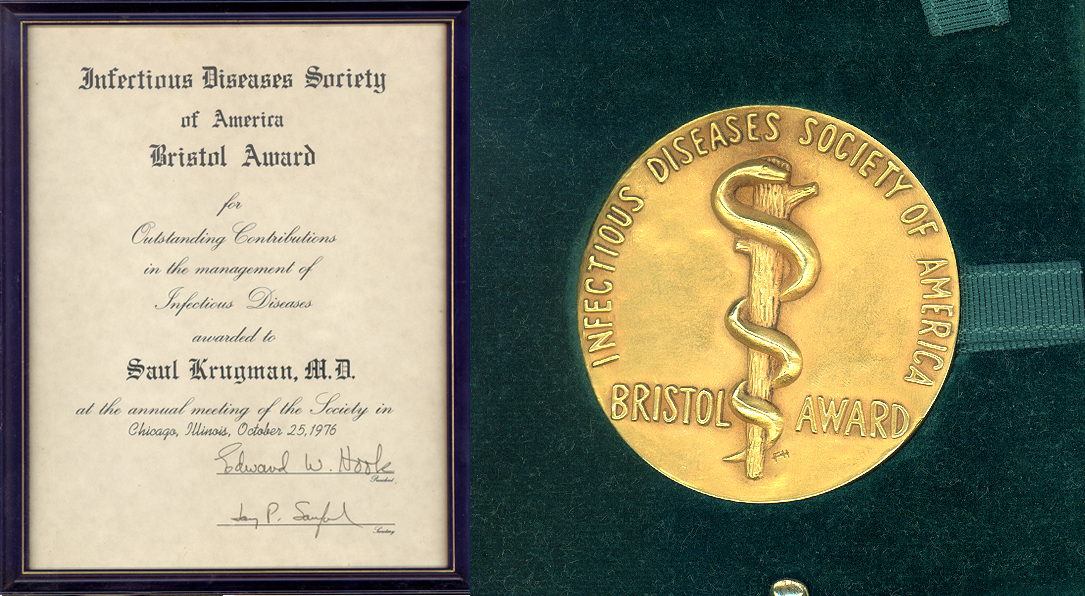
Bristol Award (left), Bristol Award medal (right)
-
A Festschrift
In April 1991, on the occasion of his 80th birthday, Saul Krugman was honored with a Festschrift. A Festschrift is a memorial volume, made up of articles contributed by pupils or associates and friends of a scientist or leader, published usually to honor some special occasion, such as a birthday or other anniversary.
Program of Festschrift symposium
Excerpts of the Festschrift published in Pediatrics, courtesy of the American Academy of Pediatrics.
Additional Awards and Honors given to Dr. Krugman
1967 - Haven Emerson Award
1972 - Modern Medicine Award
James D. Bruce Memorial Award
John M. Russell Award (Markle Foundation)
Charles H. Hood Foundation’s Child Health Award
1972-73 - President, American Pediatric Society, 1972-1973
1974-75 - Vice-President, American Epidemiological Society
1975 - The Grulee Award, American Academy of Pediatrics
1976 - The Gold Medal Award, Phi Lambda Kappa Fraternity
1977 - Elected Fellow, American Academy of Arts and Sciences
1978 - New York Academy of Medicine Medal
Robert Koch Gold Medal Award
1979 - Honorary Doctor of Science, Ohio State University
1982 - Hellenic Red Cross Gold Medal
Herman M. Biggs Memorial Medal
1983 - Infectious Diseases Society of America Citation
1985 - Albert B. Sabin Medal, German Pediatric Association
Karl Landsteiner Memorial Award
Alexander Wiener Memorial Lecture, New York Blood Center
1986 - Elected Senior Member, Institute of Medicine, National Academy of Sciences
First Pediatric Infectious Diseases Society Award
1987 - Elected to the Order of Sciences, Academy of Athens, Greece
New York Academy of Sciences Sarah L. Poiley Memorial Award
1988 - William Beaumont Prize in Gastroenterology
1990 - American Liver Foundation Distinguished Service Award
Medical College of Virginia Outstanding Medical Alumnus Award
1991 - Gordon Wilson Lecturer, American Clinical and Climatological Association
1992 - Honored at the Fifth Annual Cold Spring Harbor Conference (dedicated to Drs. Saul Krugman, Maurice Hilleman and Fritz Deinhardt)
1993 - First Annual Saul Krugman Symposium on Pediatrics Viral Infections
Miami Children’s Hospital – Ambassador David M. Walters Hall of Fame Award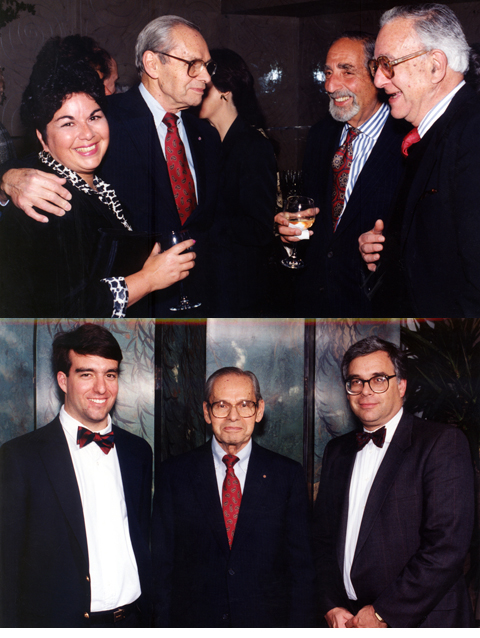
Dr. Krugman with his daughter on the occasion of his 80th birthday (top), Three generations of pediatricians. Dr. Krugman with his son and grandson (bottom)
-
Background
Saul Krugman, the son of Russian immigrants, was born in the Bronx in 1911. The family, including older sister Shirley and younger brother Seymour, later moved to Paterson, NJ, where Saul graduated from high school at the age of 18. A member of the student council and the debate team, Krugman also loved to dance and was a member of the high school’s drama club. He began his undergraduate studies at Ohio State University in 1929, and after taking time off following his junior year to earn money so he could complete his studies, Krugman graduated from the University of Richmond (Virginia) in 1934.He earned his medical degree from the Medical College of Virginia in 1939, and shortly after graduation began a two-year rotating internship at Cumberland Hospital in Brooklyn. Krugman met his future wife, Sylvia Stern, in 1939, when her brother Michael introduced them. The two married on February 18, 1940 and soon had two children – Richard, who joined his father in the medical field as a pediatrician, and who currently serves as the Dean of the University of Colorado School of Medicine in Denver, and Carol, a professional meeting planner who heads her own company, based in Florida. One of his four grandsons, Scott, has continued the family tradition of becoming a pediatrician, earning his degree at Dartmouth Medical College. He currently practices in Baltimore.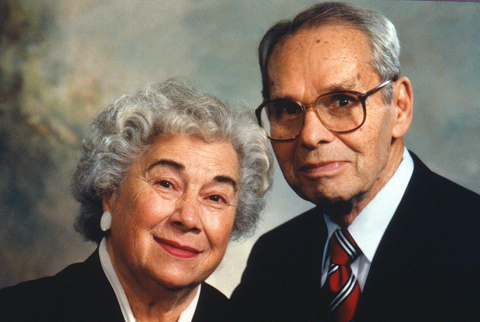
Dr. Krugman with his wife Sylvia
-
Medical degree from the Medical College of Virginia
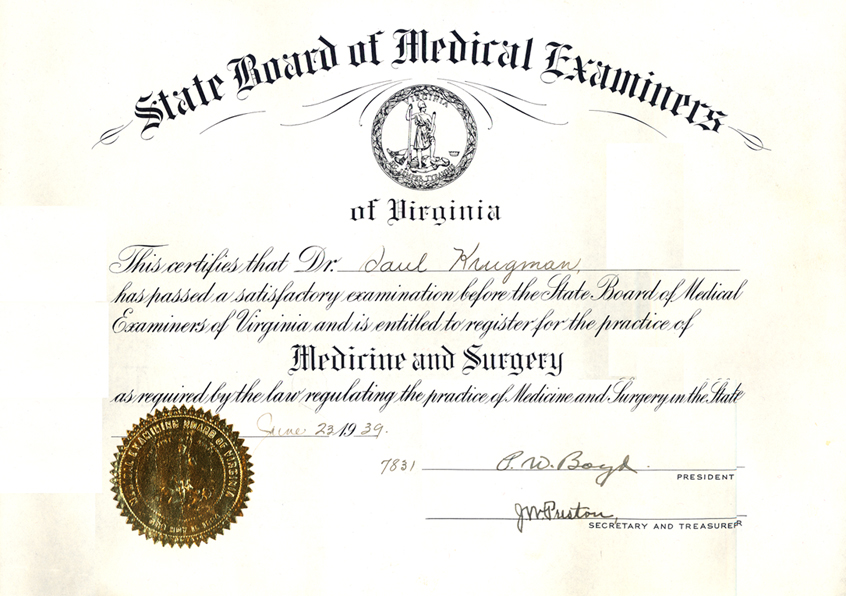
Krugman’s medical degree from the Medical College of Virginia in 1939
-
Military Service
In June 1941, with the United States heading for war, Saul Krugman entered the U.S. Army Air Corps as a flight surgeon. Captain Krugman served until 1946, and spent almost his entire military career in the South Pacific Theater. In one 13-month period, from August 1944 to September 1945, Krugman logged over 115,000 miles, primarily on air evacuation missions.
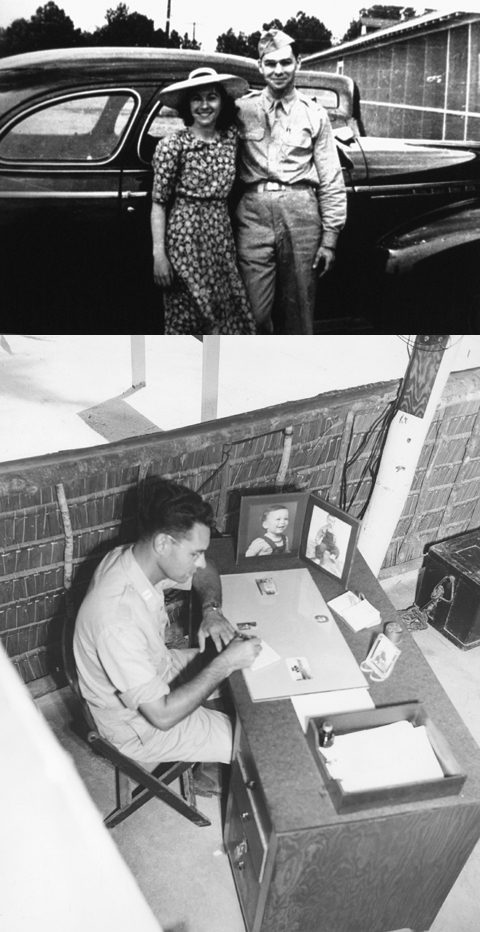
Dr. Krugman and his wife, Sylvia circa World War II (top), Dr. Krugman at desk in dispensary (bottom).
-
Dispensary and handwritten log
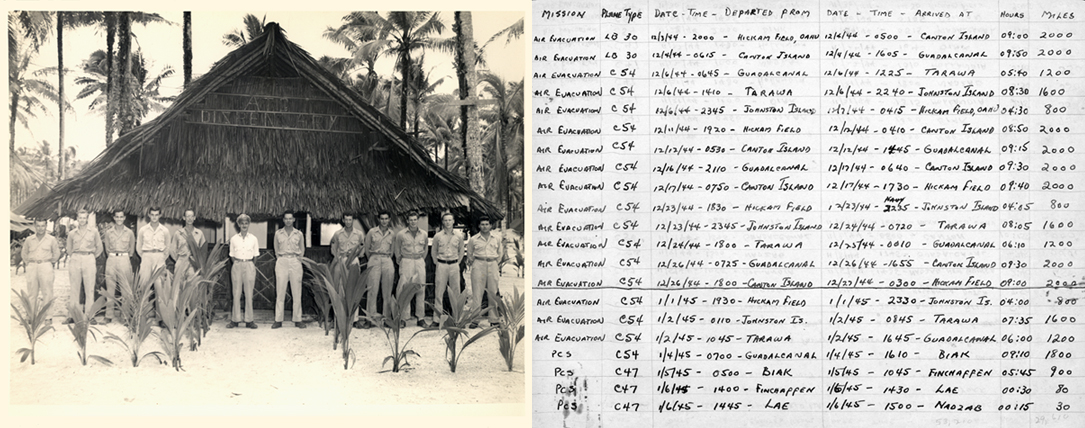
Dr. Krugman with Dispensary staff (left), Dr. Krugman's handwritten mission log 1944-1945 (right).
-
Military Service (Cont'd)
Krugman earned several honors during his military service, including a Bronze Battle Star for his Asiatic-Pacific Theater Ribbon after the South Philippines campaign, and Bronze Battle Stars for the Asiatic-Pacific Theater Ribbon after the Luzon and New Guinea campaigns. His initiative and excellent work were recognized by his superiors, and earned him a verbal commendation from the Commanding General of the Pacific Division as well as praise from Colonel Robert Brua of the Pacific Division’s Air Transport Command Medical Corps.
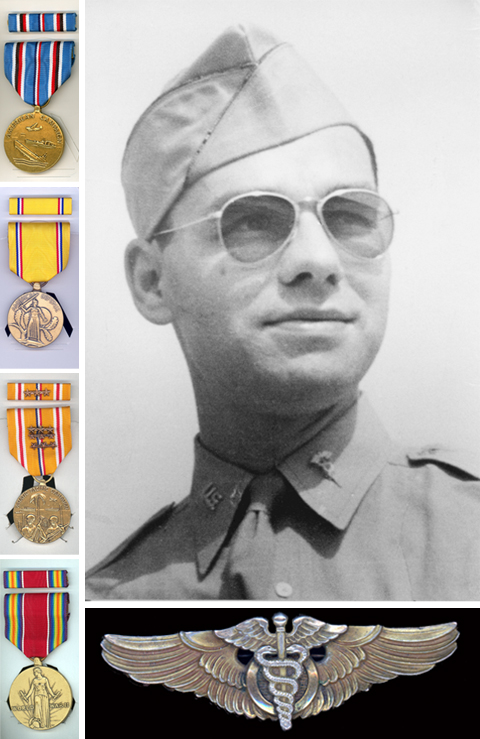
Krugman in military uniform (top), Flight Surgeon Wings (bottom), Medals from top to bottom: American Campaign Medal, American Defense, Asiatic-Pacific Campaign, WWII Victory
-
Military Service Record
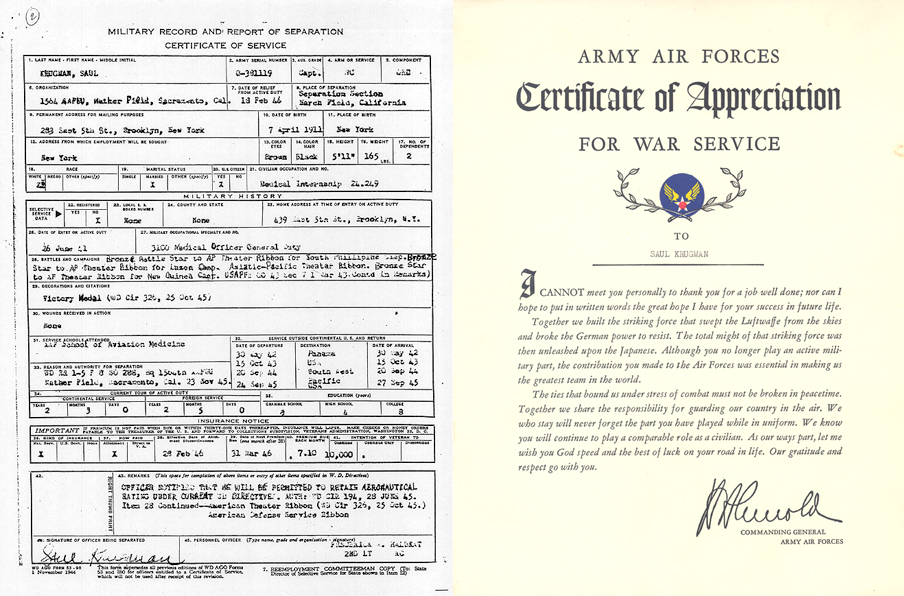
Certificate of Service (left), Certificate of Appreciation for War Service (right)
-
New York City
Following his discharge from Active Duty in February 1946, Captain Krugman returned to New York City, where he took a position as an Intern at Willard Parker Hospital. Taking advantage of an opportunity to work with Drs. Robert Ward and L. Emmett Holt Jr., Dr. Krugman soon moved to Bellevue Hospital, where, although he began as an “externe” (an intern without a salary) he steadily moved up the ranks, becoming Director of the Pediatric Service in 1960. In addition, Krugman was a professor of Pediatrics at the New York University School of Medicine, where he served as Chairman of that department from 1960-1974. During this time, he began the research on infectious diseases that would come to be the dominant focus of his career, earning him international recognition, including the prestigious Lasker Public Service Award in 1983.
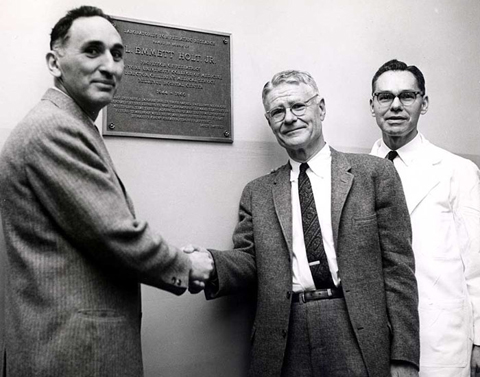
Joe Dancis (Left) shaking hands with L. Emmet Holt, Jr., Dr. Krugman stands in the back
-
Passing
After a stroke in 1991, Dr. Krugman recuperated for a while in Florida, but continued to spend time in his lab in New York. Saul Krugman loved his work, and reluctantly retired from the NYU faculty in September 1995, at the age of 84. He moved to Florida with his wife Sylvia, and suffered a second stroke in early October. On October 26, 1995, Saul Krugman died of a cerebral thrombosis. At the time of his death, NYU Department of Pediatrics Chairman Dr. Wade Parks said of Krugman, "Saul Krugman has done more to eliminate pediatric infectious diseases than any other person ever." Krugman's obituary in the New York Times read, in part:
He was a distinguished teacher, scientist and physician, respected by his colleagues and peers, and beloved by students. A national figure with an international reputation, he was the ideal of the physician and scientist. He combined the vast knowledge of pediatrics with the great abilities of an innovative and imaginative investigator to the enormous benefit to patient care.
Available in PDF:
NYU School of Medicine Memorial Service Program
-
About the Saul Krugman Collection at the NYU Medical Archives
The Saul Krugman Collection is contains materials related to honors and awards received by Krugman, biographical records, career-related documents and objects, and documents and realia from Krugman's military service during World War II. Items in these categories include, but are not limited to: photos, articles, certificates/licenses, medals, plaques, programs, and correspondence. Materials are open to researchers by appointment.
For more information about this collection, please contact us using our Reference Request Form.
